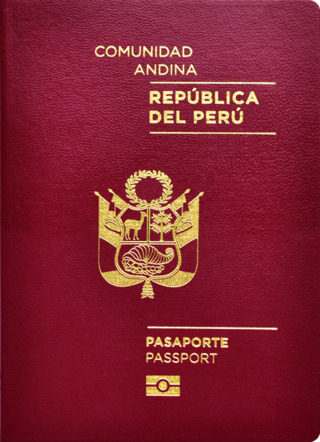
A visa is a conditional authorization granted by a polity to a foreigner that allows them to enter, remain within, or leave its territory. Visas typically include limits on the duration of the foreigner's stay, areas within the country they may enter, the dates they may enter, the number of permitted visits, or if the individual can work in the country in question. Visas are associated with the request for permission to enter a territory and thus are, in most countries, distinct from actual formal permission for an alien to enter and remain in the country. In each instance, a visa is subject to entry permission by an immigration official at the time of actual entry and can be revoked at any time. Visa evidence most commonly takes the form of a sticker endorsed in the applicant's passport or other travel document but may also exist electronically. Some countries no longer issue physical visa evidence, instead recording details only in immigration databases.

Argentine passport are issued to citizens of Argentina by the National Registry for People (ReNaPer). They were issued exclusively by the Argentine Federal Police up to 2011. Their primary use is to facilitate international travel.

A Peruvian passport is a travel document issued to citizens of Peru with the purpose of identification and to travel outside the country. It is issued by the Superintendencia Nacional de Migraciones, the Peruvian immigration and naturalization authority, which is part of the Ministry of the Interior. The Peruvian passport has the benefit of "visa free" status for member nations of the Andean Community and Mercosur, as well as several Central American nations.

Paraguayan passports are issued to Paraguayan citizens for travel outside of Paraguay. For traveling to full and associated member states of Mercosur, Paraguayan citizens can also use their civil identity cards.

The Brazilian passport is the official document for foreign travel issued by the federal government, through the Federal Police.

Argentine nationality law regulates the manner in which one acquires, or is eligible to acquire, Argentine nationality. Nationality, as used in international law, describes the legal methods by which a person obtains a national identity and formal membership in a nation. Citizenship refers to the relationship between a nation and a national, after membership has been attained. Argentina recognizes a dual system accepting Jus soli and Jus sanguinis for the acquisition of nationality by birth and allows foreign persons to naturalize.

The visa policy of Canada requires that any foreign citizen wishing to enter Canada must obtain a temporary resident visa from one of the Canadian diplomatic missions unless they hold a passport issued by one of the 53 eligible visa-exempt countries and territories or proof of permanent residence in Canada or the United States.

Visitors to Brazil must obtain a visa from one of the Brazilian diplomatic missions unless they are nationals of one of the visa-exempt countries or have the option to obtain an electronic visa. For stays longer than 90 days or for employment in Brazil, all foreign nationals must have a visa or residency authorization.

The Southern Common Market, commonly known by Spanish abbreviation Mercosur, and Portuguese Mercosul, is a South American trade bloc established by the Treaty of Asunción in 1991 and Protocol of Ouro Preto in 1994. Its full members are Argentina, Brazil, Paraguay and Uruguay. Venezuela is a full member but has been suspended since 1 December 2016. Associate countries are Bolivia, Chile, Colombia, Ecuador, Guyana, Peru, and Suriname.

Visa requirements for Argentine citizens are administrative entry restrictions by the authorities of other states placed on citizens of Argentina.

Visa requirements for Bolivian citizens are administrative entry restrictions by the authorities of other states placed on citizens of Bolivia.

Visa requirements for Brazilian citizens are administrative entry restrictions by the authorities of other states placed on citizens of Brazil.

Visa requirements for Colombian citizens are administrative entry restrictions by the authorities of other states placed on citizens of Colombia.
The visa policy of the Philippines is governed by Commonwealth Act No. 613, also known as the Philippine Immigration Act, and by subsequent legislation amending it.

The visa policy of the United Kingdom is the policy by which His Majesty's Government determines visa requirements for visitors to the United Kingdom, and the Crown dependencies of Guernsey, Jersey, and the Isle of Man and those seeking to work, study or reside there.
Visa requirements for Paraguayan citizens are administrative entry restrictions imposed by the authorities of foreign states on citizens of Paraguay.

Currently, Mercosur is composed of five full members, five associated countries and two observer countries:

Visitors to the Dominican Republic must obtain a visa from one of the Dominican Republic diplomatic missions unless they are citizens of one of the visa-exempt countries.
Visitors to Argentina must obtain a visa from one of the Argentine diplomatic missions unless they are citizens of one of the visa-exempt countries.

The British Overseas Territories maintain their own entry requirements different from the visa policy of the United Kingdom. As a general rule, British citizens do not have automatic right of abode in these territories.













